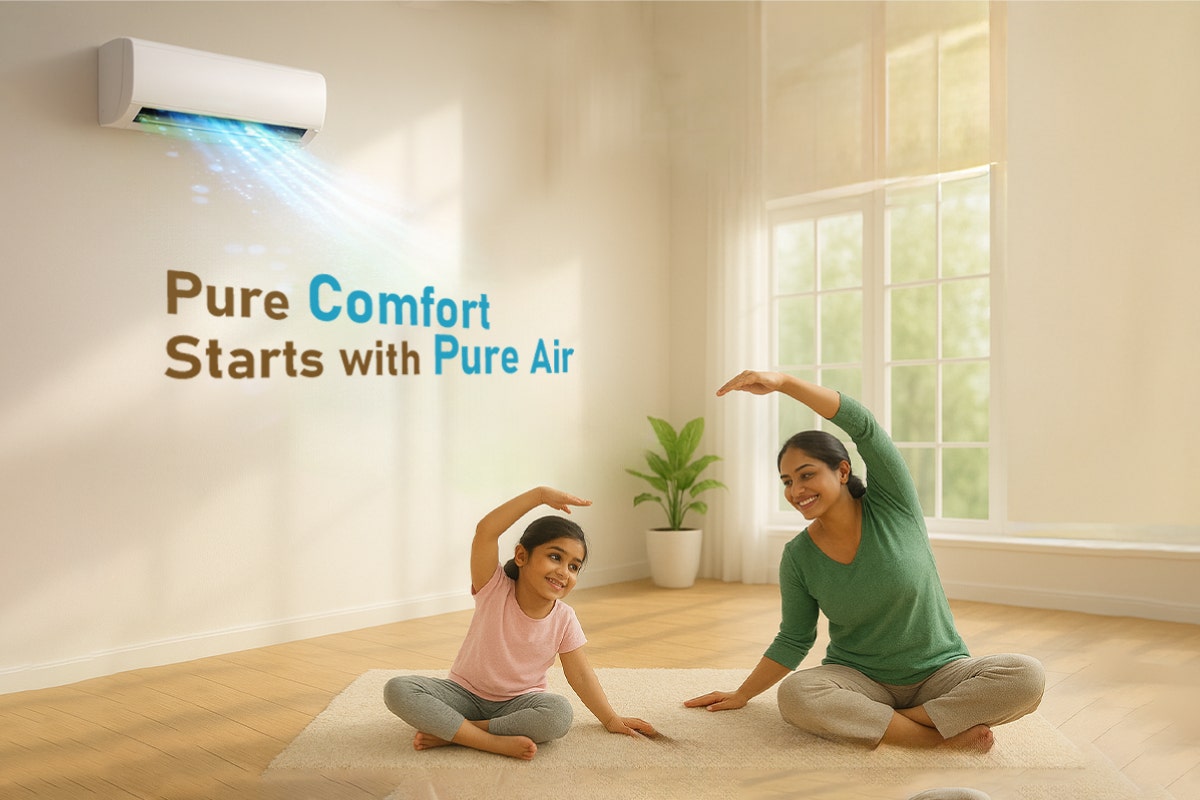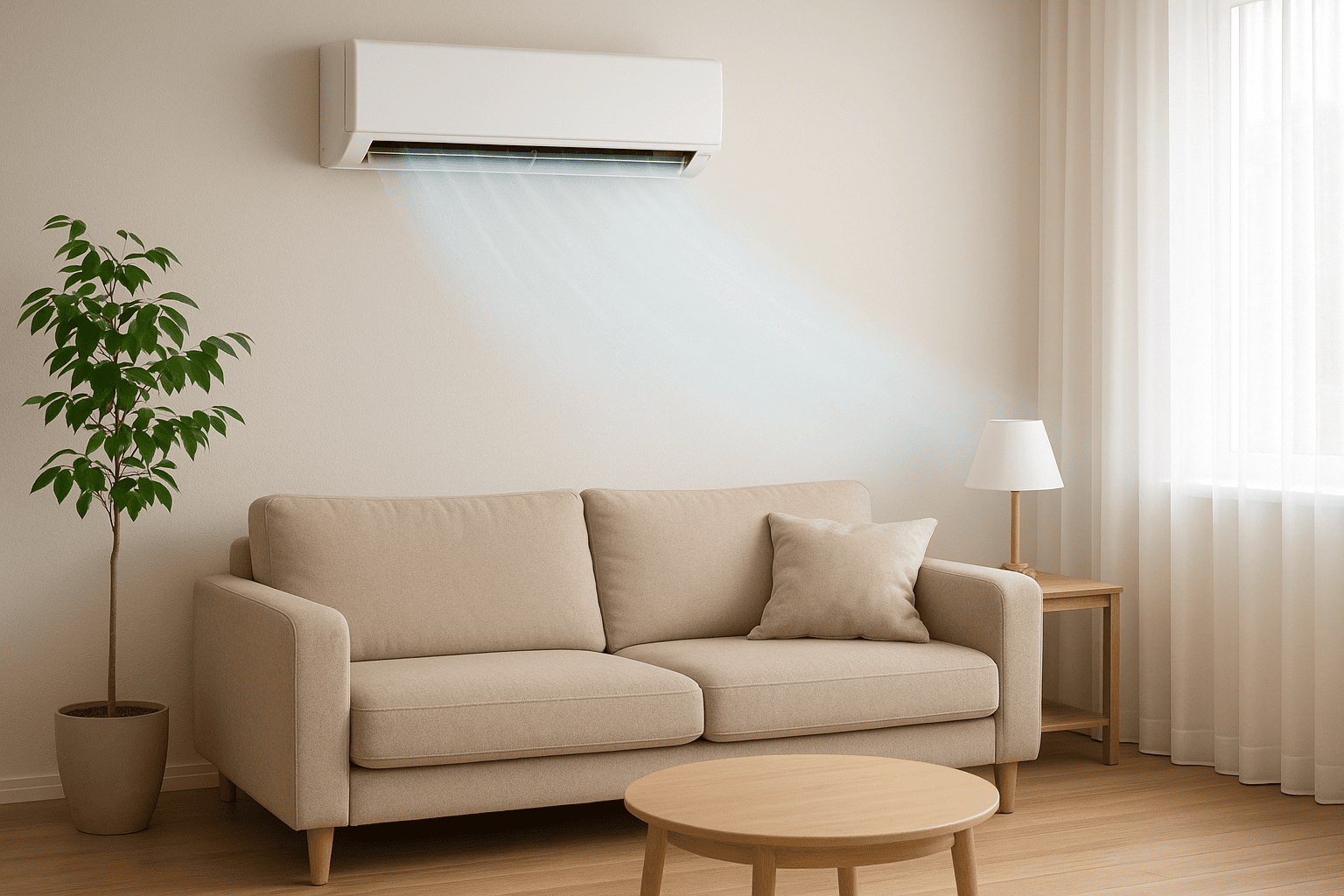Beyond Cooling: How Modern ACs Improve Indoor Air Quality and Health


Once, air conditioning was considered a luxury appliance for the rich. Now, the concept has changed. Air conditioning is not only for cooling rooms these days; it's a necessary home electronic device that improves the health and quality of everyone’s life. It enhances the comfort and well-being of the elderly and newborns.
In Bangladesh, the current summer season has brought extreme heat and humidity, making air conditioning an essential part of daily life. The soaring temperatures and oppressive air quality are pushing many households to rely on their ACs for more than just cooling. As the summer heat becomes increasingly unbearable, air conditioning has transitioned from a luxury to a must-have appliance for comfort and health.
Modern AC units have evolved as smart machines beyond simple cooling, purifying the air to offer a safe house from external pollutants and allergens. Let’s reveal how modern ACs enhance indoor air quality with a healthy air conditioning system.
Impact of Poor Indoor Air Quality on Health
Indoor air quality plays a crucial role in our overall health and well-being. When the air inside buildings is contaminated with pollutants, it can lead to many health issues. Common sources of indoor air pollution include mold, dust, pet dander, smoke, and chemicals released from household products.
Exposure to bad indoor air can cause respiratory problems, such as asthma and allergies, and can aggravate existing health conditions. The symptoms of air-related illness may include coughing, sneezing, fatigue, and eye irritation. Long-term exposure to bad indoor air can lead to serious health problems and affect overall quality of life. Newborns and the elderly need good air flow otherwise they can suffer from many diseases.
However, diseases that may occur due to bad indoor air are:
Respiratory Problems: People with pre-existing respiratory issues like asthma and allergies are particularly vulnerable to poor indoor air quality. If they live in bad indoor air, the symptoms may increase problems and lead to coughing, shortness of breath, and even life-threatening asthma attacks.
Eye Irritation: Dust, pollen, and other airborne particles can cause significant eye irritation, leading to redness, itching, watering, and discomfort. Long-time exposure to these pollutants can cause chronic eye conditions.
Dermatological Issues: Airborne allergens and irritants in the bad indoor air intensify skin diseases such as rashes, eczema, and dermatitis. People with sensitive skin are more susceptible to these conditions.
Neurological Diseases: Some neurological problems, such as headaches, dizziness, fatigue, and cognitive impairment, may appear due to the VOCs(Volatile Organic Compounds) and other particles in the indoor air.
Intellectual Decline: Poor indoor air quality negatively impacts intellectual function and may reduce concentration and productivity.
Benefits of Quality Indoor Air
Maintaining quality indoor air has several comfort and health benefits. It reduces respiratory issues, improves sleep quality, and ensures a comfortable living environment. Let’s explain the benefits of having quality indoor air in your place.


Benefits of Quality Indoor Air from Modern Air Conditioning Systems Related to Health and Well-Being:
Air conditioners help ensure better health and increase happiness. Here are their various advantages.
Improve Air Quality: Modern AC units can improve Indoor air quality and health to maintain a healthy living environment. The AC system makes the air purer and breathable by eliminating allergens, contaminants, and other particulates. Air conditioners manage humidity to prevent mold growth, a key factor in health issues. They create a refreshing indoor environment, benefiting those with allergies or respiratory problems like asthma.
Minimizes Heat-Induced Health Issues: Extreme temperatures can cause dangerous health issues like heat stroke and exhaustion. Modern AC reduces the risk of those health issues by ensuring a sustainable, cozy environment at a suitable temperature.
Reduces Asthma and Allergy Problems: Smart air conditioners for health can relieve asthma and allergy problems. You can rely on the AC for asthma and allergy prevention. Select an AC with allergy relief features like HEPA filters, UV light purification, and multi-stage filtration that reduce allergens and improve indoor air quality.
Improve Sleep Quality and Comfort: Maintaining a suitable indoor temperature is essential for better sleep and comfort. Modern air conditioners create ideal sleeping conditions. They ensure uniform and steady cooling everywhere in the house and can align the room temperature with the natural body temperature at night.
The sleep quality and the temperature control further ensure emotional betterment, cognitive body function, and stress relief.
Enhances Productivity and Mental Well-Being: An ideal indoor air temperature boosts productivity and well-being. Researchers found that extremely high or low temperatures reduce the focusing power, data processing capacity, and work efficiency. An AC unit with advanced features can retain a balanced indoor temperature with healthy air quality that enhances professional activities, performance, and learning capabilities.
Protects Children and Elders: Modern air conditioning units protect seniors, infants, and individuals with chronic illnesses by creating a stable indoor environment. Elderly people and infants have less effective thermoregulation, making them more vulnerable to temperature changes. These systems help maintain a safe temperature, preventing harmful conditions for individuals with heart disease and other health issues.
Safeguard Home Appliances and Minimize Insect Infestations: ACs protect home appliances and reduce insect activity by keeping the room cool and dry. Molds cannot grow on the furniture due to the dry weather, and it also discourages pests.
Other Advantages:
The other benefits of ACs are:
1.Environmental and economic advantages,
2. Reduced odors, decreased absenteeism,
3. Protection from mold and other contaminants,
4. Enhanced airflow and ventilation.
The above are the different benefits of the Indoor air purification AC system. Now let’s see some best AC for air quality.
Leading Brands for Air quality improvement features in ACs
Renowned air conditioner manufacturing brands, such as LG, eco+, Haier, and Butterfly, have different models with various features for air quality improvement. You may purchase these ACs considering the room size, filtration efficiency, humidity control, energy efficiency, and smart features.
When temperatures soar and air quality worsens in the current summer season, choosing the right AC with advanced air filtration and humidity control becomes more important than ever. These brands are offering tailored solutions to ensure comfort, health, and energy efficiency during the hottest months.
Our House of Butterfly offers the best price for the eco+, Haier, Butterfly, and LG AC. Check out our locations to find the best deals on air conditioners this summer!
FAQs
Which AC mode is good for health?
-The dry or dehumidification mode is considered the best AC mode. It helps maintain a cozy indoor humidity level for respiratory health and well-being. This also reduces mold and mildew growth, which are common allergens.
Does air conditioning improve health?
-Yes, air conditioning can improve health by regulating temperature, controlling humidity, filtering air, and promoting better sleep. However, you must maintain your AC properly to get those health benefits. Improper use or maintenance can lead to adverse health effects.
Responsible use, natural ventilation, and healthy habits can maximize the health benefits of your AC.
Does AC increase oxygen?
-No, AC doesn’t increase oxygen in a room. It cools and moves the air around, not creating or adding oxygen. If you’re in a tightly sealed room with the AC running for a long time, the oxygen levels might drop slightly because people breathe it in and release carbon dioxide.
To keep the air fresh, open a window or use ventilation to let some outside air in.
Does AC remove CO2?
-No, air conditioning (AC) does not remove carbon dioxide (CO2) from the air. AC systems are designed to cool and circulate indoor air but do not filter out or reduce CO2 levels.
If a room is sealed tightly and lacks proper ventilation, CO2 can build up over time as people exhale it. To lower CO2 levels, fresh outdoor air needs to be brought in by opening windows, using ventilation systems, or installing specialized air purifiers. Regularly ventilating the space is key to maintaining healthy indoor air quality.
How can we use AC for good health?
-You can use the AC for good health by maintaining some simple techniques and settings-
-
Set the temperature at a comfy 24–26°C (75–78°F) so you don’t get too cold.
-
Maintain a humidity level (around 30–50%) to keep the air from getting too dry or sticky.
-
Clean the filters regularly to keep the air fresh and free of dust or allergens.
-
Open windows or use a fan to bring in fresh air and avoid stale, stuffy spaces.
-
Don’t crank the AC too low—big temperature swings can leave you feeling off.
-
Drink plenty of water since AC can dry out the air.
-
Use timers or smart settings to save energy and avoid overcooling.
-
Be sure the cool air isn’t blowing directly on you to prevent stiffness or soreness.
Final Thoughts
Modern AC units are more than just cooling devices; they are essential for maintaining healthy indoor air quality and overall welfare. By investing in advanced AC technology, you're not just buying comfort, you're investing in a healthier, happier life for you and your family.
In Bangladesh, with the intensifying summer heat and air pollution levels rising, the need for such advanced air conditioning systems is more critical than ever. The combination of cooling and air filtration will help tackle both extreme temperatures and harmful pollutants, ensuring a safe, breathable environment indoors.
AC with air filtration will be worth your investment in the long run. It will add extra satisfaction and relaxation to you and your family.

